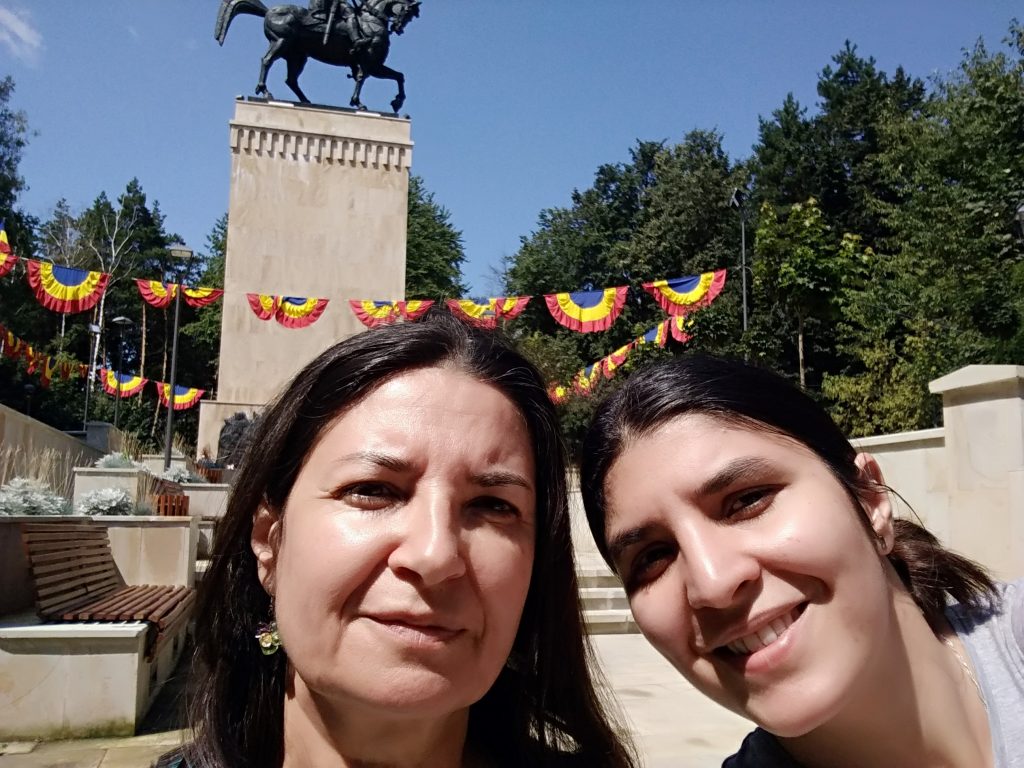Earlier this week, the University joined WISE’s #1ofTheMillion Day campaign to celebrate over 1 million women working in STEMM roles in the UK for the first time ever. On our Twitter we shared insights from some women in the Faculty about working in STEMM, including from PhD student Ana-Madalina Ion. Ana wrote this blog about a special woman who inspired her to pursue a career in STEMM…
Hello! My name is Ana Madalina Ion (on the right) and I am a final year PhD student in the Faculty of Medical Sciences, Mitochondria Research Group. I come from Romania. I have a bachelors in Biochemistry from the University of Bucharest, and a masters of research from Radboud University, Nijmegen (Molecular Mechanisms of Disease). I did my master thesis in Bordeaux as an Erasmus student, on mitochondria protein degradation, and I liked mitochondria so much that I decided to pursue a PhD in this area.
I would like to introduce you to my inspiring woman in STEMM.

The STEMM woman who has inspired me the most and has always encouraged me when I was feeling down is my mother (on the left). Her name is Carmen Angela Ion and she is an aeronautical engineer. She graduated from the Polytechnic University in Bucharest, the Faculty of Aeronautical Engineering, the specialization engines. She graduated in 1986, at a time when my country was still communist, and when the number of graduates was strictly correlated with the number of open positions. People were not allowed to go abroad and there were no private companies where to find jobs, so one could only work in the public sector. Therefore, each year, only a small number of students were accepted in a faculty, a number approximately equal to the number of opening positions. So, not many students were accepted at a faculty each year, and even fewer of them graduated.
My mother was one of them. She went for a ”men-oriented” university, and chose an even more ”men-oriented” specialization: engines. She recalls how when she would go to classes, she would count how many women she could see. My mother always loved maths, so when she went to the university, people advised her to go study mathematics and become a teacher. They would say that teaching is a more female-friendly job, that gives you more time for kids and a family; engineering was too tough for a woman.
My mum didn’t care. I wish I could say I am proud of her, but as I have no contribution to her graduation, I can only say I am happy she did. It was tough, very tough, but she made it. She didn’t give up, she graduated, and now she works as an aeronautic inspector at the Romanian Civil Aeronautic Authority from Bucharest.
She did take a break to raise me and my sister. She started working again when I was 15. Being a mum at home was another fight for her, because everyone was expecting that she start working immediately after her maternity leave was over. She was judged for not giving me to be raised by my grandparents, for deciding to have another baby even if she didn’t have a salary. She didn’t care.
She was also praised by some intellectual women, which did not help me. One teacher from secondary school told me how grateful I should be to my mum, because she sacrificed her career for me and my sister. My teacher’s words haunted me a long while, because it implied that a woman can only choose one of the two: career or children. Growing up, I struggled understanding that women can have both. And when I grew up enough to talk to my mum about her choice, she told me that she simply didn’t want to miss us growing up. It was never a sacrifice, she never regretted it. She became a full-time mum for 15 years because she decided to.
My mum didn’t follow patterns that others have created for her. She did not give up when she was judged. And that is very inspiring.
As a funny ending, I would like to share with you a story. My mum has a female friend from the university, an aeronautical engineer in another city. One night, her friend was called in at her home because one of the passenger planes had a fault and she and her team had to go repair it. When she arrived close to the plane, the flight attendant lady, seeing a woman, asked her, “Oh, are you the catering?” (apparently the flight attendant had ordered some food). “No, madam”, my mum’s friend replied amused, “I am the aeronautical engineer. I came to repair your plane.”
I hope this made you smile. Women in STEMM are strong, smart and stubborn. Very, very stubborn. Thank you for reading.
Thank you to Ana for sharing her wonderful story with us – if you have a story to tell about an inspirational person in your life, we’d love to share it! Get in touch at fms.diversity@newcastle.ac.uk.

